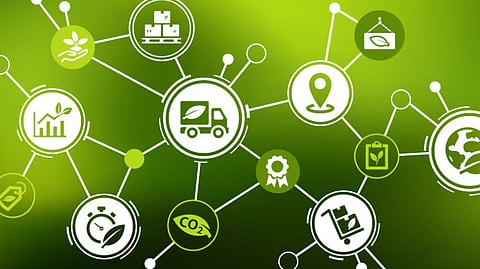Supply Chains Make Up 40% to 80% of an Organisation’s Total Carbon Emissions
According to supply chain consultant Efficio’s new research report, 'Bridging the Gap', Supply chain emissions typically make up 40% to 80% of an organisation’s total carbon emissions, and can even exceed 90%.
Edward Cox is a Principal and Sustainable Procurement Practice Lead at Efficio, a global procurement and supply chain firm which has been supporting governments and companies in the GCC with supply chain and ESG-related advice for several years.
Cox said: “Supply chains are most organisations’ largest source of emissions, and procurement can and should be the engine for change. Procurement needs to be accountable for a growing set of metrics that have ESG at their core.
"Buying the right things, from the right suppliers is more important than ever.
“There is a misconception that being sustainable will always cost you money. The first 25% of emissions reductions may actually be cost-neutral and, in some cases, you can save money.”
However, making sustainability improvements may often be easier said than done: quantifying and achieving visibility on sustainability impacts, such as supply chain emissions, is often challenging. Without this, it’s often hard to know where to start.
In light of this, governments and major companies in the GCC are increasingly looking for ways to quickly quantify emissions, identify hotspots, and start the long journey to reduce carbon emissions from their supply chains.
Efficio has developed CarbonCube® – a tool that leverages spend data to empower supply chain managers to understand emissions across the supply base to help with target-setting, measurement, and positive action.
An example of the effective deployment of the CarbonCube® is a full-scope carbon baselining by a large Technology company in KSA.
Commenting on the project, Cox said: “This project was a real-world example of how carbon emission reductions can be achieved across the entire supply chain, and how organisations are starting to understand that a more sustainable procurement approach is becoming important to future success for both the private and public sectors across the GCC.
“The goal of achieving net zero, globally, is of existential importance and arguably the priority for all governments in the area of sustainability. That global target under the Paris Agreement is 2050, to which the UAE align, but some countries have their own targets stretching to 2060 including Saudi Arabia and China.
“Is it achievable? It is hard to predict. But governments and large companies in the UAE, KSA, and across the GCC are really starting to focus on this – and have the funding to make it happen.” Engaging with the CarbonCube® is a great place to start.
“When procurement decisions truly have Sustainability considerations at their heart, then we will make a huge leap forward in the critical pursuit of Net Zero and building a better, more sustainable future. Organisations proactively doing this are to be applauded.”
Read More: Emirates Post Announces Winners of ‘Logistics Unleashed’ Robotics Competition


